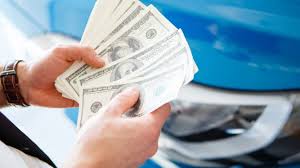Buying a Car: Should You Pay With Cash if You Can?
Some financial advice websites are touting the virtues of paying cash for literally everything. From your home to travel, to college tuition, and cars, cash is supposedly the only way to go according to these wealth gurus. With your salary and financial plan, this may not be right for you. Some sage advice like “Save your pennies for a rainy day.” ring true through the ages, but some money advice just isn’t practical for the average consumer whose last name isn’t Buffett.
What some experts fail to mention is that there are many great reasons to take out an auto loan as opposed to paying cash on the barrelhead. We’re not talking about the old beater you buy from your neighbor with your pizza delivery money, this advice refers to your first real dependable car with involvement of a traditional lender, like a bank or reputable auto finance agency.
According to Budgets are Sexy, good reasons to avoid paying cash are building your credit history, protecting your nest egg and low interest rates.
Here’s Why You Should Never Buy a Car With Cash Garrett Parker 4 Years Ago
2020 Buick Enclave Avenir 3
Some financial advice websites are touting the virtues of paying cash for literally everything. From your home to travel, to college tuition, and cars, cash is supposedly the only way to go according to these wealth gurus. With your salary and financial plan, this may not be right for you. Some sage advice like “Save your pennies for a rainy day.” ring true through the ages, but some money advice just isn’t practical for the average consumer whose last name isn’t Buffett.
What some experts fail to mention is that there are many great reasons to take out an auto loan as opposed to paying cash on the barrelhead. We’re not talking about the old beater you buy from your neighbor with your pizza delivery money, this advice refers to your first real dependable car with involvement of a traditional lender, like a bank or reputable auto finance agency.
According to Budgets are Sexy, good reasons to avoid paying cash are building your credit history, protecting your nest egg and low interest rates. Let’s take a more in depth look at these.
Build Your Credit History
Having no credit history leaves you at a disadvantage when going for a big ticket item like a home mortgage for $250,000. A car loan for $15,000 to $20,000 is much easier to obtain for a newly minted graduate with their first job or a divorcee trying to establish credit in his or her name. For example, if a twenty something with their first real job buys an vehicle, even a small compact model that’s affordable, and pays on time religiously, they will be in a great position to get the best rate on a home mortgage loan when they settle down. For those new to budgeting, a car loan is a better first step into the debt world than credit cards, as it is much easier to manage a predictable payment each month, than opening a bill and wondering how much you actually ran up for take out and shopping on your Visa. Pay cash for the pizza, and the laptop, but finance the car. Your argument may be that you have student loan debt, but you need a car, and unless someone buys it for you as a graduation present, you will need to keep the savings you have for a cushion. Better to finance a dependable used or economy new car than pay cash for a lemon you found on Craigslist.
If a man or woman is newly divorced, finances can be tough to sort out. Once the papers are signed and the smoke clears, it will be time to rebuild a life. Hastily splashing an anticipated settlement funds on a sporty new car may leave you without a security deposit or down payment for a new home. Plus, a car paid in full is considered a nifty paid asset to haggle over, and if you purchase before the financial details are worked out, you may see your ex-spouse drive away in it. Your soon to be ex may not find your car so attractive if they also get a payment booklet.

It’s good to have options
I mentioned optionality before, and that’s a luxury of having cash on hand. Building up thousands of dollars in savings isn’t easy, so when the time comes to do something with it, it’s always worth weighing the options.
Investing is just one way they could use they could use the cash. If they have existing credit card or student loan debt with higher APRs than the auto loans they’d qualify for, it might make sense for them to finance the car and pay down those other accounts with the money they’ve saved.
There are a couple of caveats to all of this:
- The numbers aren’t going to work this way for everyone weighing a car purchase. Unfortunately for people with average or poor credit, the higher the APR, the less likely it is that the investment returns will outweigh the cost of the loan.
- Financing the car only makes sense if you’re confident you’ll be able to make the monthly payments throughout the loan term.
- That 7% average stock market return I cited is based on decades of data. There are five-year periods that have crushed that average (such as 2012-2017) and five-year periods that have dramatically underperformed it (such as 2006-2011). This just reinforces why it’s best to look at investing with a long time horizon.
- There’s one golden rule to remember with loans: Don’t let credit stretch your budget. In my friends’ case, they shouldn’t be willing to spend more than they’d originally planned just because they have access to more money.

Cash vs. Financing
Before we get into the question of cash versus financing, a little background is in order for shoppers who haven’t had much experience buying a new car.
If that sounds like you, here’s the deal: When it comes to buying a car, you generally have two ways to go about it. You can either finance the car, which means you pay it off over time, or you can pay cash, which means you buy the vehicle outright as if you’re picking up a new book at the bookstore and handing the clerk a $20 bill.
The advantage to financing is that you’ll usually end up with a better car than you can if you’re paying with cash. For example, if your car budget is $8,000, you’ll buy a used car if you pay in full, but if you use that $8,000 as a down payment on a new car, you can expand your automotive horizons greatly. If you have good credit, you can easily afford many new models.
The only drawback is that you’ll need to make monthly payments in order to pay off the loan that allowed you to buy the newer, more expensive vehicle. Included in those payments is interest, which is a fee you pay the bank for allowing you to borrow the money in the first place.

It can help prevent you from overspending
When you buy a car with cash, you must use the money you have on hand to pay for it, so you’ll be forced to stick to your budget. When you finance your purchase, it’s easy to spend more than you planned, especially if you focus on the monthly payment instead of the total price of the car.
For example, let’s say you plan to finance no more than $25,000. But then the dealer begins running through the list of add-ons, like all-weather floor mats, a heated steering wheel or splash guards — and some are hard to resist.
Let’s say those features add another $2,000 to the price of the car. If you got a 60-month loan term and 5% interest rate, this would mean that your monthly payment would increase from roughly $472 (with a $25,000 loan) to $510 (with a $27,000 loan).
That monthly increase may not seem like much, but you’d end up paying $264 more in interest over the life of the loan, on top of the extra $2,000 you didn’t plan to spend.
You won’t pay interest
If you don’t finance your car purchase, you’ll save money by avoiding interest payments. For example, if you buy a car that costs $30,000, make a $5,000 down payment and finance the rest, you’d need a $25,000 loan. If the loan came with an interest rate of 4.5% and a 48-month loan term, you’d pay $2,364 in interest over the life of the loan.
Why you should pay cash for a car?
The short answer is because owning a car is expensive! And owing money on it makes it even more expensive. In its 2014 survey, AAA determined that the average cost to own a car is $8,876 per year, based on 15,000 miles of driving. Now that’s an average, and it can be affected by the cost of the car you own, how much you drive, where you live, and of course, how much you borrow to buy it. It’s an ugly number, especially when you consider that many or even most households have two or more cars.
But let’s get a little bit more specific; why should you pay cash for car?
- You’ll spend less by paying cash. Paying cash for a new car is tough. It hurts to pull money from a savings account to buy a car that you know will go down in value. That will serve as the built-in limit on how much you will pay for the car. On the other hand, it’s pretty easy to sign a note to cover most of the cost of buying a new car. You won’t be so concerned with the final cost of the vehicle, as long as it isn’t coming directly and immediately out of your bank account. Financing will encourage you to buy a more expensive car.
- Paying cash can get you discounts. You may have to make a choice between a rebate (discount on the price) and zero interest financing. That means that zero interest isn’t free. Cash gets you the discount price, which is the cost you pay for taking advantage of zero percent financing. And when you pay cash, you may even be able to negotiate a better price, particularly on a used car.
- You avoid paying interest. This is of course completely obvious, but it’s worth repeating. If you don’t finance your purchase, you won’t pay any interest. How important is that? If you borrow $32,000 for five years at 6%, you’ll have a payment of $618.65 per month. That means you’ll pay total interest of $5,118.98 over the life of the loan.
- Paying cash requires financial discipline. It takes discipline to pay cash, because paying cash is not easy. But when you develop discipline in one area of life, the spills over to other areas, and this will serve you well.